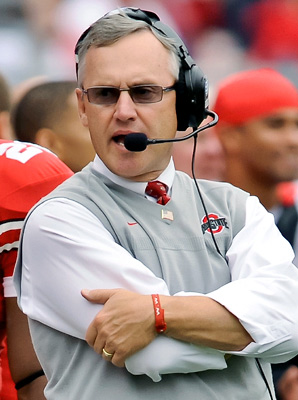Tressel maneuver is brilliant PR, but NCAA will have final say
Tuesday, The Columbus Dispatch reported that after the NCAA upheld a five-game suspension for five key Buckeyes who swapped memorabilia for cash and tattoos, Buckeyes coach Jim Tressel asked the school to increase his own suspension to five games for hiding the entire affair from the NCAA.
After an abomination of a press conference last week that public relations professors will use for years as an example of how not to handle a crisis, Tressel and Ohio State made a brilliant PR move on two fronts Thursday. First, the increase in the suspension allows Tressel and the school to say to the NCAA that Tressel finally understands the gravity of hiding knowledge of the tattoo parlor transactions after being tipped off by an April 2010 e-mail from former Ohio State player Christopher Cicero as well as the severity of essentially lying to the NCAA twice -- once when he signed a disclosure form in September pledging that he had no knowledge of any potential violations and again when he said nothing of the e-mails when investigators looked into the case in December. Second, by leaking this news on the first day of serious NCAA tournament action, the Buckeyes knew coverage of the move and the necessary rehash of the slimy circumstances that preceded it would get buried beneath an avalanche of buzzer-beaters.
As PR goes, it was BCS-bowl worthy. But that's all the suspension increase was. PR, and nothing more.
This isn't over. Not even close. The NCAA's Committee on Infractions will have the final say, and the committee can accept Ohio State's penalties or add to them. (One addition almost certainly will be the vacation of 12 wins in 2010. After all, Ohio State's head coach knowingly played at least two ineligible players.)
Thanks to Tennessee basketball coach Bruce Pearl, who also lied to NCAA investigators and who also was charged with violation of Bylaw 10.1 (unethical conduct), we have a handy road map for how Tressel's case should play out. A lot of people thought Pearl's troubles were behind him after Tennessee docked his salary and the SEC suspended him for the Volunteers' first eight conference games this season. That simply wasn't the case.
Tennessee received a Letter of Inquiry from the NCAA in September for a case involving Pearl and recruits attending a cookout at his home during an unofficial visit. Pearl's penalties were applied shortly after that. Tennessee received a Notice of Allegations from the NCAA in February. The notice spelled out the precise allegations against Pearl and former football coach Lane Kiffin. Tennessee is scheduled to appear before the Committee on Infractions in a few months.
Whether Pearl will be employed by Tennessee at the time is in doubt.
Wednesday, Tennessee athletic director Mike Hamilton gave a bizarrely timed interview with Knoxville radio host Jimmy Hyams that suggested Pearl's job is in serious jeopardy. Perhaps Tennessee's brain trust realized that the COI hasn't been historically kind to coaches found to have broken Bylaw 10.1.
The NCAA is still investigating Tressel's case, so it's unclear when Ohio State will receive a Letter of Inquiry, a Notice of Allegations or a date with the COI. A lot can change between now and then, but the mountain of evidence and the fact that the case involves just one person should allow the case to move up the docket quickly.
Thursday's move by Tressel can only help. The COI hammered USC in the Reggie Bush case in part because of the arrogance of USC athletics officials during the investigation. Instead of contrition, former USC athletic director Mike Garrett and company gave the NCAA nothing. In Ohio State's case, NCAA officials have to be furious about Tressel's actions because the NCAA cut a sweetheart deal with the Buckeyes that allowed the affected players to play in the Sugar Bowl. This at least gives the appearance of contrition, and on it's surface, it's a fairly serious upgrade in discipline.
Instead of only missing warmups against Akron and Toledo, Tressel also will miss games against Miami, Colorado and Big Ten rival Michigan State. His suspension now also mirrors the suspensions of quarterback Terrelle Pryor, tailback Boom Herron, receiver DeVier Posey, offensive tackle Mike Adams and defensive end Solomon Thomas. That suggests Tressel considers himself equally at fault.
The only catch is that historically, the NCAA considers lying to the NCAA a far more serious offense than selling memorabilia. The penalty for the latter, based on the ones handed out to Buckeyes players and former Georgia receiver A.J. Green, is four or five games. Oklahoma State receiver Dez Bryant was suspended for Oklahoma State's final 10 games in 2009 after it was found he lied to investigators. In 2010, USC assistant Todd McNair received a one-year show cause penalty after the COI determined he knew about and failed to report that Bush was receiving money from a sports agent.
One of the conditions of McNair's show cause was a one-year ban from recruiting. No in-home visits. No phone calls. No contact with players on official visits. No contact even with signees who had yet to enroll. Less than a month after McNair received the show cause penalty, USC declined to renew his contract.
The McNair case should be especially troubling to Tressel. The NCAA's evidence that McNair "knew" about the arrangement between Bush and wannabe agents was questionable at best. In Tressel's case, the NCAA has a set of smoking-gun e-mails. If Tressel received a similar penalty to McNair, Ohio State athletic director Gene Smith and president Gordon Gee would have to make some hard choices, because a coach who can't recruit for a year is awfully difficult to employ.
But maybe Thursday's move will mitigate the final judgment. If anything, it should help Tressel receive a lighter sentence from the court of public opinion.





